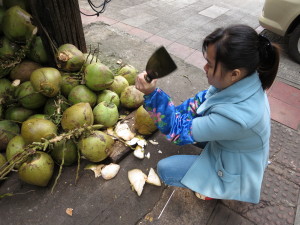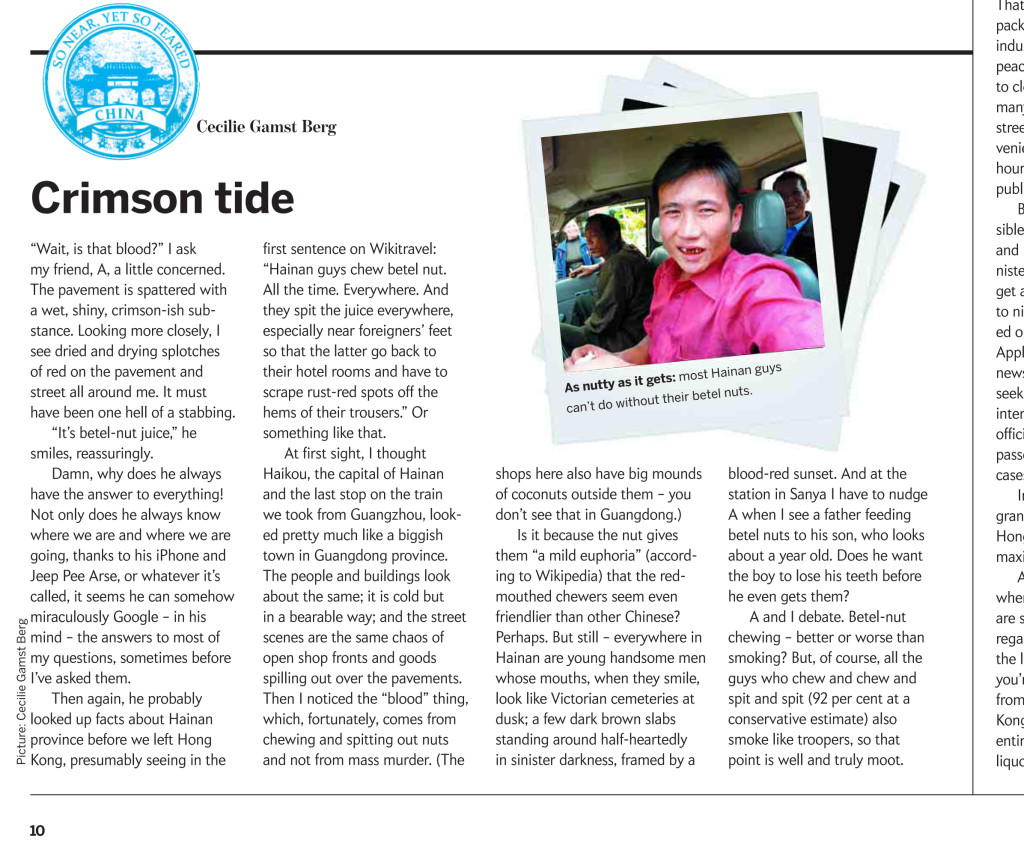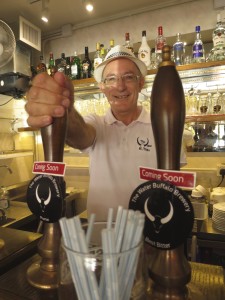- Details
Red Tide And Dragging Editing
Ahhrghhh! I normally love making and editing films but this one from Hainan Island is dragging. Is it because I made it a long time ago and it’s no longer fresh? Or is it because I’m at home without air conditioning but Hainan was cold and jacket-y and it was so much fun with the coconuts and Christmas extravaganza decorations and most of all, the betel nut juice?
That’s one thing I really didn’t get to capture in the video: The way every guy’s mouth was a deep crimson with the teeth all gone. I find this not an ideal look for men, but maybe that’s just me?
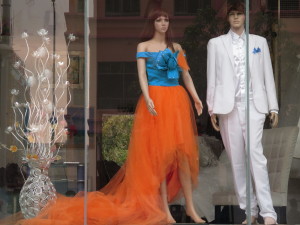
Well, I will finish the video, by hook or by crook. Meanwhile here’s some more information about the sacred betel nut:
海南島 (Hoi Lam Dou – Sea South Island/Hainan)
檳榔 (ban long – betel nut)
- Details
Finally Lantau Becomes Modern
Recently we Lantau residents have been bombarded with information about how our lives will be so infinitely better; first with the mega-incinerator with its “no emissions” and now with another 1 million people in the →
Last Word About the Worst Flu Ever.
Have you had it? Who hasn’t? Shitty province. But I kind of love it!
Culture Cracks
Most of my live Cantonese sessions are done in the venerable Honolulu Coffee and Cake Shop, one of the last proper cha chanteng in Central. The last venue (see film above), whose name I can’t →
Siu Heng! 肇慶
In the column below I bemoan the fact that my first Inner Guangdong town, (where I coined the phrase ‘hovelage’ – excellent traditional Chinese architecture made to last but a little careworn) has become a →
Cantonese World Supremacy!
Ever since my friend suggested I should teach Mandarin (NEVER!!! Down with simplified characters and cultural imperialism!) new Cantonese students have been pouring in. There was something about making a decision, having a goal in →
I’m a Devil Hag and Proud of it
Are you a woman? Caucasian or Caucasian with benefits? Do you live in Hong Kong? Then you may have referred to yourself at some point as “Gwailou”. Guess what, you’re not. Only men can be →
Miyakojima! 宮古島
The mainland is all well and good, in fact better than well and certainly better than good, but there other countries around here. Japan for example. Not that this tiny island that’s much closer to →
The Only Cantonese Lesson You’ll Ever Need (Crash Course in Light Conversation)
This week my first specialised crash course kicked off, with two excellent and fast learners, working titles ah-Lei and ah-Ga. In only two and a half hours, they learnt enough Cantonese to go into any →
Chinese Characters
Chinese characters (normal, not simplified) are beautiful, aren’t they? Even ordinary words like ‘toilet’ look somehow elevated to a higher sphere when they’re written with a brush, or printed for that matter. Not that the →
肇慶 Beautiful Siu Heng – Great As Long As You Don’t Dabble
Oh China. I love you so much. This is Siu Heng, the town where, on top of the many scraggy crags, there are signs (signage) exhorting people not to “parapet”. No Parapeting! the signs say →
- Details
Dumbing Down of Chinese Culture
When the communists, soon after they came to power in 1949, introduced simplified Chinese characters, it was ostensibly to reduce illiteracy on the mainland. However, their real objective was to enable peasants and other illiterates to read the incessant propaganda posters the Party kept churning out.
Therefore to this day mostly words useful for propaganda such as "change," "long live" and "factory" have been simplified. Many characters have been simplified only by removing, or even changing the position of, two or three strokes, which makes one think how necessary this simplification really is.
When people are learning to read and write anyway, can't they just as well learn "貝" ("shell" in traditional writing) as "贝"? Is it really more difficult to remember "並" (combine) than the simplified "并"? "參" (join) than "参"? "廁所" (toilet) than"厕所"?
Now mainland authorities have trumped through their long-held insistence of simplified Chinese being the only Chinese writing allowed in the UN, to the chagrin of Taiwan, many Hong Kong people and not a few overseas Chinese, for whom even newspapers and magazines printed on the mainland are usually published in traditional script.
Many Chinese characters are put together by joining a component for meaning with the component for sound. By cutting out the meaning component from the character, you are just left with the sound component.
Thus the character for the sound "gan" which can mean "to do" and "dry" using, in traditional writing, the two different characters "幹" and 乾", are both simplified to "干." This has led to the ludicrous situation on the mainland where "gan" (to do, and also in slang "do it" which in many dictionaries are translated into English as "f***" is used in the English translation of menus as "f***" for the word "dried," as in "F*** the salt beautiful pole duck chin" (Salty dried ducks' beaks.)
Instead of students of Chinese being able to work out roughly the meaning of the character by understanding the meaning component of the word and the sound by the sound component, with simplified characters they have to know that "干" stands for both "dry" and "do" by already knowing the sound and the meaning.
Therefore, you have to already know what you're learning, which rather defeats the purpose of education.
Despite more than fifty years of simplified characters on the mainland, many restaurant and company owners prefer to use traditional characters in the name of their business, as traditional characters are considered more elegant.
A few years ago the Chinese government cracked down on the use of traditional characters on business signs, making them illegal. This has not stopped many business owners from carrying on with the practise of using traditional characters, and especially in the southern part of China, the fronts of restaurants and other businesses are replete with beautiful traditional characters.
Indeed it seems like the mainland authorities have had as much success in banning traditional characters from signs as the French have had in banning English words from their language.
Simplified characters are at their worst downright ugly ("个" instead of "個," "习"instead of "習" and "无" instead of "無", ) and at best incomprehensible for the casual observer.
China has come a long way since trying to educate the illiterate masses of the 1950's. Now that most Chinese children go to school, I think it's time for the mainland to bring back traditional characters to celebrate the great heritage of the Chinese language, instead of forcing the ugly and ill thought-out simplified characters on the world. Then they can enable the masses to read the classics in their original form, as well as bringing China in line with the rest of the Chinese-writing world.
Having done this, they can leave the Chinese written language to evolve naturally, letting usage define simplification to ease understanding, like every other language on earth.
- Details
Love Craft Beer? Love Buffaloes? Come to Pui O!
Interview with Chris Riley, owner of the excellent Water Buffalo restaurant in Pui O.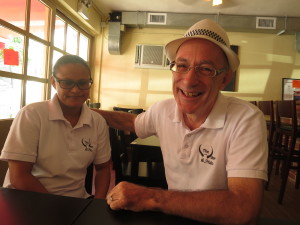
Now you don’t have to travel to Inner Lancashire to experience real English food, and ale, and pale brewish ale and whatever they are all called. You can just nip around Pui O on Lantau Island! That’s what I did one lovely day in June/July to interview Chris for Radio Lantau. (Okay, I live there, but still). As you can hear in the interview, the guy really knows what he’s doing, and judging by the crowds of people inside and outside every day, the beer he promised in the interview has now arrived.
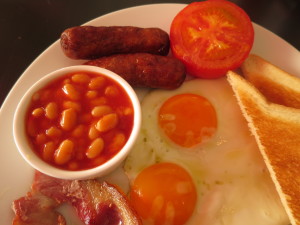
I went out of my comfort zone and ordered my first ever Real English Breakfast, and it was excellent!
Talking of excellent food: Don’t forget my TWO Sichuan dinners this week: Thursday August 18th, 7.30 pm AND Saturday August 20th from 6-ishpm. And I serve lager, for I am a lager man.
水牛 – Seoi au (water buffalo)
英式早餐 – Ying sek jou chan (Britain Style Breakfast)
鬼佬涼茶 – Gwai lou leung cha (Devil geezer cool tea/beer)
Contact us today
Email info@learncantonese.com.hk
to find out how you can start learning Cantonese.

